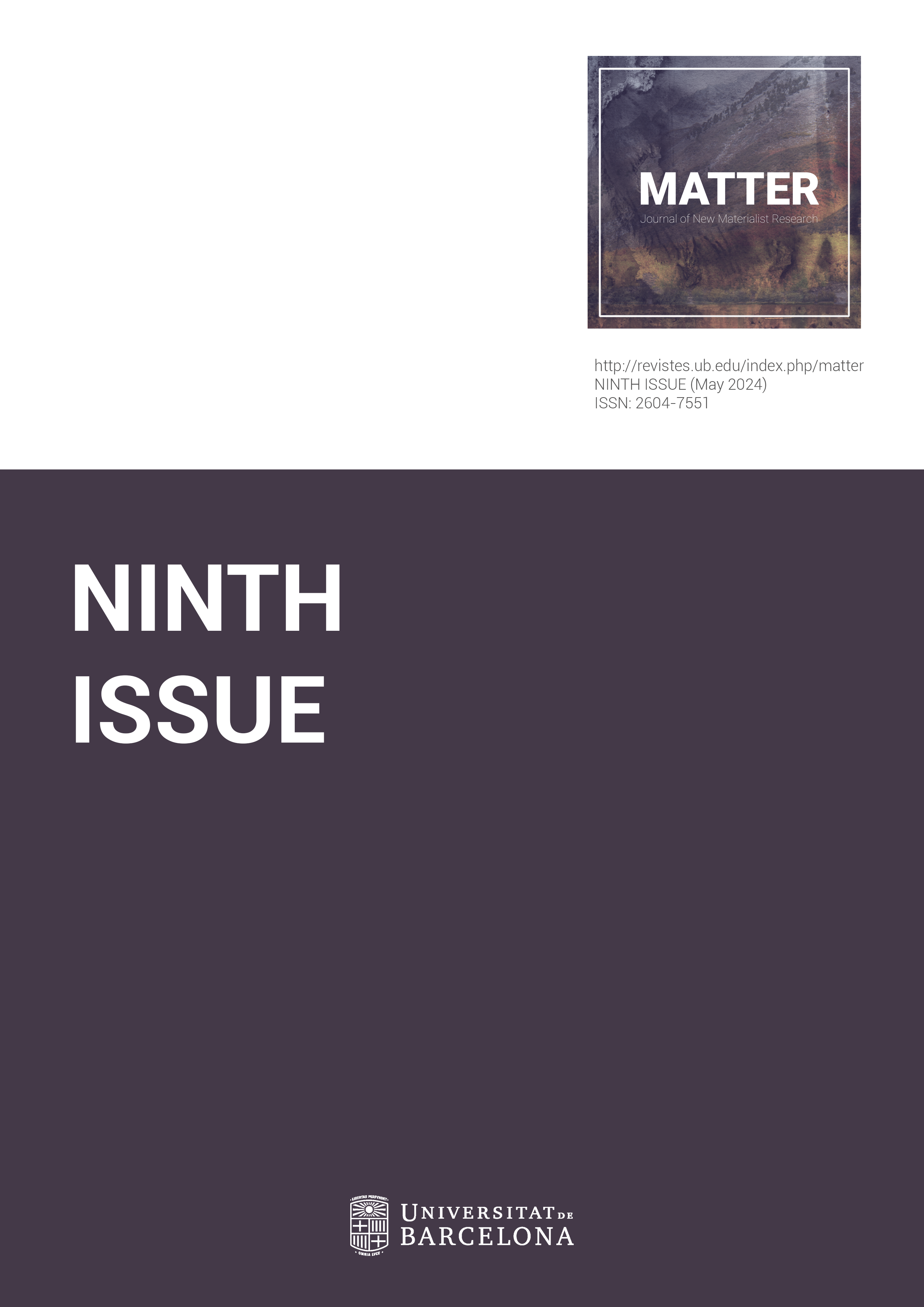L'arxiu com a aparell que fa el món a l'antropocè
DOI:
https://doi.org/10.1344/jnmr.v9.46480Paraules clau:
Arxiu-des-extinció, Antropocè, precaritat, contraapocalipsi.Resum
Aquest text té com a objectiu explorar l'arxiu com una força poderosa que dóna forma a la vida. En conseqüència, busca desenvolupar un marc ètic per a l'arxiu des d'una perspectiva feminista. La de-extinció pot vincular-se a l'arxiu com un aparell estabilitzador i un escenari de responsabilitat (Wolfe, 2018) que implica el nostre compromís ètic de reconèixer la radical passivitat d'aquells que ja no existeixen en aquest món, tant com a individus com a espècies. Aquest escenari de responsabilitat està entremesclat amb l'agència de l'arxiu. En altres paraules, l'arxiu actua com un aparell creador de vida en donar forma a les condicions per a la lectura, el futur i, en certa mesura, la realitat mateixa. En establir els fonaments per a una ètica de l'arxiu com una pràctica que crea vida, aquest text té com a objectiu reformular el discurs entorn de l'extinció i la de-extinció.
Descàrregues
Referències
Braidotti, Rosi, & Hlavajova, Maria (2018). Posthuman glossary. Bloomsbury Academic.
Dawson, Ashley (2018). Bio-capitalism and de-extinction. In Richard Grusin (Ed.), After extinction (pp. 173–200), University of Minnesota Press.
Derrida, Jacques (1967). L’Écriture et la diffèrance. Seuil.
Derrida, Jacques (1995). Archive fever: A Freudian impression. Trans. Eric Prenowitz, Chicago University Press.
Derrida, Jacques (2003). Autoinmunity: Real and symbolic suicides. A dialogue with Jacques Derrida. In Borradori, Giovanna, Habermas, Jürgen, & Derrida, Jacques, Philosophy in a time of terror, University of Chicago Press.
Derrida, Jacques (2006). L’animal que donc je suis. Galilée.
Derrida, Jacques (2009; 2011). The Beast and the Sovereign. Trans. Geoffrey Bennington, University of Chicago Press.
Freud, Sigmund (1950 [1925]). A note upon the ‘Mystic Writing Pad’. In The Standard Edition of the Complete Psychological Works of Sigmund Freud, trans. James Strachey & Anna Freud (pp. 227–232). Hogarth.
Freud, Sigmund (1961 [1929]). Civilization and its discontents. Trans. James Strachey, W.W. Norton & Company Inc.
Glazryna, Yulia (2020). Welcome to the Anthropocene! In Axel Straschnoy, The Permian Collection (pp. 4–9). Bombus.
Haraway, Donna (1988). Situated knowledges: The science question in feminism and the privilege of partial perspective. In Feminist Studies, Vol. 14, No. 3 (Autumn), 575–599.
Hayles, N. Katherine (1999). How we became posthuman: Virtual bodies in cybernetics, literature, and informatics. The Chicago University Press.
Heise, Ursula K. (2003). From extinction to electronics: Dead frogs, live dinosaurs, and electric sheep. In Wolfe, C. (Ed.), Zoontologies. The question of the animal (pp. 59–82), University of Minnesota Press.
Labarre, Suzanne (2019, August 1). MoMA curator: “[Humanity] will become extinct. We need to design an elegant ending”. Fast Company. https://www.fastcompany.com/90280777/moma-curator-we-will-become-extinct-we-need-to-design-an-elegant-ending
Lowenhaupt Tsing, Anna (2015). The mushroom at the end of the world: On the possibility of life in capitalist ruins. Princeton University Press.
Mancuso, Stefano (2019). La nazione delle piante. Laterza.
Parikka, Jussi (2015). A geology of media. University of Minnesota Press.
Pownall, Augusta (2019, February 22). "We don’t have the power to stop our extinction” says Paola Antonelli. dezzeen. https://www.dezeen.com/2019/02/22/paola-antonelli-extinction-milan-triennale-broken-nature-exhibition/
Serres, Michel (1997). Le parasite. Hachette.
Snæbjörnsdóttir, Bryndís, Wilson, Mark (n.d.). Trout fishing in America and other stories. https://snaebjornsdottirwilson.com/projects/trout-fishing-in-america/trout-fishing-in-america-and-other-stories/
Why humanity should embrace its ‘inevitable’ extinction, (2020, January 20). BBC. https://www.bbc.com/reel/video/p080w0dg/why-humanity-should-embrace-its-inevitable-extinction
Wolfe, Cary (Ed.). (2003). Zoontologies. The question of the animal. University of Minnesota Press.
Wolfe, Cary (2010). What is posthumanism?. University of Minnesota Press.
Wolfe, Cary (2018). Condors at the end of the world. In R. Grusin (Ed.), After extinction, University of Minnesota Press.
Zylinska, Joanna (2017). Nonhuman photography. The MIT Press.
Zylinska, Joanna (2018). The end of men. A feminist counterapocalypse. University of Minnesota Press.
Descàrregues
Publicades
Número
Secció
Llicència

Aquesta obra està sota una llicència internacional Creative Commons Reconeixement 4.0.
The authors who publish in this journal agree to the following terms:- Authors retain copyright and grant the journal the right of first publication.
- Texts will be published under a Creative Commons Attribution License that allows others to share the work, provided they include an acknowledgement of the work’s authorship, its initial publication in this journal and the terms of the license.






